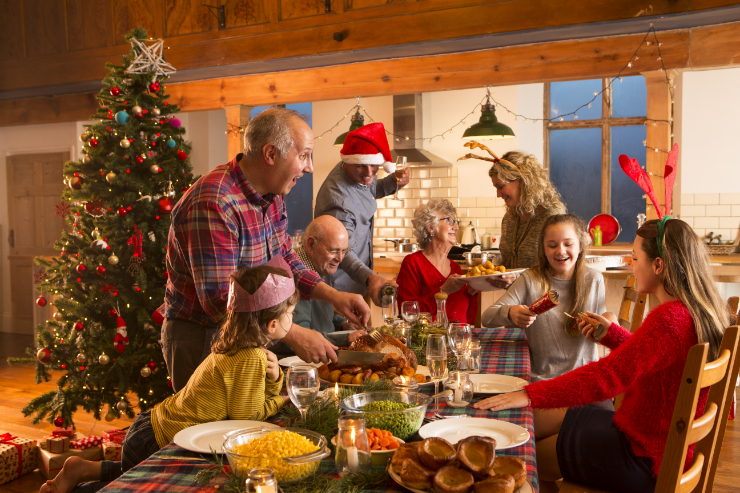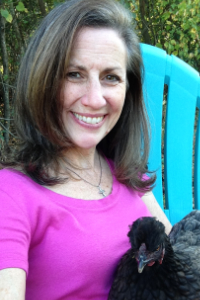Reclaiming Christmas Magic
by Susannah Pearce | December 21, 2016 12:04 am

Sometimes in secret moments I lament that Christmas has lost its magic. When I was little—like most other kids I knew—Christmas and birthdays were high points of the year. Christmas had the added delight of a whole season of preparation and societal festivities. It seemed forever away and the anticipation was dizzying. The feast day burst upon a family with lights, sweets, song and presents.
Fast forward to adulthood and some of that sparkle often becomes a bit lackluster. Actually making the preparations, ticking off my mandatory gift list, dragging out boxes of decorations (and the thought of putting them away again) aren’t as fun as they were when my responsibilities ended with letting my parents know what I wanted for Christmas and letting sugar-plums dance through my head.
It helps to have children in the house to recapture some of that magic. It makes it more fun when we put on Christmas for them. We decorate and revive the customs we grew up with, adding new ones, perhaps. We teach them through our observances and celebrations what Christmas is. Hopefully, they’ll be left with a more complete understanding of the great greatness that is the Incarnation of the eternal God; the Mystery of Christ.
I was talking about this with my friend, Laurie, recently. She is the youngest of eight children in a family that stirs up thoughts of the Waltons TV show. She described her family’s Christmas morning: a lavish cornucopia of giving! Her family was not particularly affluent, materially anyway. They were rich in children and love.
Her favorite part as a child was waking up and rushing down to see the Christmas tree deep in a sea of gifts. With eight kids, each receiving a gift from and giving to parents and exchanging with each other, you might need a slide rule to figure the present count. They went to morning Mass and ate a big breakfast before plunging into the gifts. Laurie remembers that she would do her best to delay the opening as long as she could because she knew the magic lay in the anticipation, in the hope – the unopened gifts. Once they were unwrapped, something was lost. Once it began, the end was near.
This reminds me of Caryll Houselander’s meditation on Mary’s Advent, her expectation the Incarnation of the Word of God.
“Humanly speaking, the time of Advent must have been the happiest time in Our Lady’s life… But sometimes a pang of grief must have shot through her; for example when the young wheat grew and she saw it pierce the earth with little swords. Perhaps the first sword to pierce her heart was a blade of green wheat.
“For was not her precious burden a grain of wheat sown in a field?
“Was He not bread? The world’s bread that must be broken?”
When I focus only on the magic of Christmas—the gift giving, the decorations, the feasting—I might miss the mystery of Christmas. The Mystery of Christ includes His life, death, resurrection and return. To overcome death, He had to die. It is what He was born for—on Christmas.
Caryll Houselander goes on:
This is what it meant to Mary to give human nature to God.
He was invulnerable; He asked her for a body to be wounded.
He was joy itself; He asked her to give Him tears.
He was God; He asked her to make Him man.
He asked for hands and feet to be nailed.
He asked for flesh to be scourged.
He asked for blood to be shed.
He asked for a heart to be broken.
The stable at Bethlehem was the first Calvary.
The wooden manger was the first Cross.
The swaddling bands were the first burial bands.
The Passion had begun.
Christ was man.
True as this may be, it would be wrong to not celebrate the birth of Jesus Christ, even knowing it heralds His death. Mary did. The Angels did. The kings of the world adored Him, the second person of the Blessed Trinity, contained in the tiny being lying in a manger. They brought Him the best the world had to offer. If I wish to be wise, I ought to do the same.
Let us bring Him our gold. In a literal sense, I can give of my plenty to Him in the “distressing disguise of the poor.” While I feast, I should help others to feast. It is fitting that we all feast on Our Lord’s birthday. I will give more generously.
Let us bring Him our frankincense. Incense is offered to God. I should look inside my heart to see if the God who created and redeemed me is the god I truly worship. Or, do I adore His gifts? Do I give Him my first and best? I will examine my conscience, confess and amend my life.
Incense represents our prayers rising to God. Are my prayers like a burning thurible, sending fragrant smoke billowing up to Him? I will pray better. I will seek to open my heart to His.
Let us bring Him our myrrh. Myrrh means “bitter” and was used to prepare a body for death. Do I offer my life to the One who died for me? Am I willing to receive as a gift all the bitterness that comes so it may unite me to His redemptive work? Am I willing to lay my life down—if not in bodily death, in the death of inconvenience—for those He loves? I will need Your help, Lord, to pour out myself to the last drop as You did.
And so, as I make the preparations for Christmas this Advent, I will strive not so much to create magic, but to enter into the mystery of Christ. I wish for Jesus to abide in my heart as Mary carried Him under her heart on the journey to Bethlehem.
With the gifts under the tree in the living room, let me place my whole self on the tree of the cross with Him. I wish to give him my vulnerability, my joys and tears, my hands and feet, and my heart. He will open my gift and transform it into a life more fully lived.
I suspect when I give myself as a gift to Our Lord, the results will be magical.
Please share this post on social media.

Susannah Pearce
Author Bio:
I’m a Catholic homeschooling mom of two, who supports Distributism (thinking small and local with regard to economics), universality (with regard to respect for the dignity of the human person), humor (with regard to humor), integrity (with regard to what we should strive for).
I’m from Southern California and am now living in The South with my husband (a writer) and two kids—and an unspecified number of chickens! I do many things badly because that’s often the best I can manage. Ever heard G.K. Chesterton’s quip? “Anything worth doing is worth doing badly.”
Susannah has a MA in Theology from Franciscan University in Steubenville and blogs at: Slow Going[1].
- Slow Going: https://slowgoinglife.blogspot.com
Source URL: https://integratedcatholiclife.org/2016/12/pearce-reclaiming-christmas-magic/